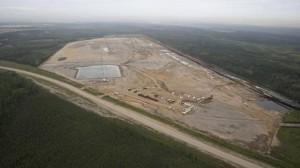
from Earth First! News
Groups working against the Alberta tar sands are celebrating today, as oil companies announced that they are abandoning the Joslyn oil sands mine due to rising costs.
Among the problems with the new oil sands project was the lack of cheap infrastructure, such as pipelines—a problem generated largely by popular resistance.
“Joslyn is facing the same challenge most of the industry world-wide [is], in the sense that costs are continuing to inflate when the oil price and specifically the netbacks for the oil sands are remaining stable at best – squeezing the margins,” said André Goffart of Total’s Canadian division.
The understanding that the same challenges are being met by industry world-wide is heartening, as it exposes a major material weakness. Much of the cost inflation comes about through difficulties posed by local populations rejecting industrial expansion, extraction, and exploitation.
According to Carrie Tait, a reporter at the Globe and Mail, “Rising costs for labor and materials have long worked against the economics of new projects, and limited pipeline access to ship oil has weighed on prices for Alberta oil. Total is signed up to ship oil on three major undeveloped pipeline projects facing uncertainty: Keystone XL, Northern Gateway and the Trans Mountain expansion.”
The blocking of these infrastructure points has limited finance to megaprojects, creating gaps in development and causing structural complications. Also, the technology has been shown to be inadequate: Joslyn was originally supposed to use wells rather than industrial shovels, but a well exploded, and the technology was shelved.
Two of the partners involved in Joslyn are not giving up on tar sands, however. Another mine, Fort Hills, is regarded as more feasible, and will be targeted for development before the companies try again in Joslyn in a few years.
There are also other tar sands expansions occurring right now, such as Canadian Natural Resources’s Horizon oil sands, which has been over budget, but still profitable.
That means it will take more pressure to stop these projects—not only against pipelines, but also megaloads, export terminals, and beyond.

